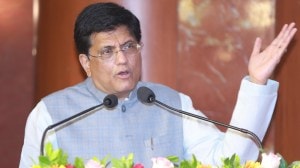Vajpayee8217;s day after
There is a fallacy in the argument that Pakistan's test have vindicated New Delhi's nuclear initiative. Islamabad had made it clear in 1987,...

There is a fallacy in the argument that Pakistan8217;s test have vindicated New Delhi8217;s nuclear initiative. Islamabad had made it clear in 1987, when I interviewed Dr A.Q. Khan, father of Pakistan8217;s bomb, that they too had the bomb. He was unequivocal and categorical in declaring: quot;Tell them we have it.quot;
At that time the same experts, hawks and intellectuals who surround Prime Minister A.B. Vajpayee today pooh-poohed my story. They said that Pakistan was in no position to manufacture toothpaste, so how could it make the bomb? I was told that I had been quot;sold a pupquot; and that I had become a conduit for Islamabad8217;s disinformation. I have been vindicated, not the government.
If we have developed nuclear facilities secretly after 1974, so have they. We took years to accumulate fissionable material, work on the designs and finally commission the tests. None of this was made public then. All we did was to bruit about the fact that we were a peaceful nuclear power. As one Indian scientist has wryly remarked, quot;Thereis no bomb which is peaceful.quot;
After 1987, Pakistan also started the covert process of building facilities. They even imitated the Indians by claiming they were only interested in nuclear energy for peaceful purposes. They got Beijing8217;s assistance, as Nawaz Sharif admitted while announcing their nuclear tests. China was only one of many sources. Khan was personally involved in collecting data, blueprints and machinery from Holland and Germany.
Both countries have had the bomb in their basement for at least a decade. The only surprise element is that India decided to detonate first. New Delhi is desperately seeking to justify the tests because it was inadequately prepared to inform the public earlier. The BJP is also a little too coy in rejecting the accusation that it hoped to make political capital out of the tests.
One only has to read the party8217;s election manifesto and to study statements made many years ago to realise that the BJP, and the Jan Sangh before it, has been committed to nuclearweaponisation. But, out of power, it was for the most part a theoretical exercise of demanding something that could not be achieved. When the BJP8217;s moment of destiny finally arrived, party leaders realised they had a golden opportunity to implement a long-standing pledge.Of course, that is not the entire story. Many other political parties have also wanted the bomb, but they preferred to keep the option open rather than go public. When Mrs Gandhi tested the first bomb in 1974, she could have opted for many more tests, but she backed down under outside pressure. Since then, we have always had the option to test, besides growing technical competence.
The common thread linking the BJP, Congress and other pro-bomb parties is that they have all toyed with the nuclear option as a way of asserting India8217;s place in the sun. There is nothing wrong in that. But when one party decides to grasp the nettle, it is better to be straightforward about the motives than to hide behind phony excuses about nationalsecurity.
This is where the confusion arises. First, the Prime Minister said the tests were necessary because of external threats. He did not name any nations but in his letter to President Clinton made it clear that he was referring to China and Pakistan. When this argument didn8217;t sell, South Block changed tack and said India8217;s tests were a necessary pre-emptive move in anticipation of Pakistan8217;s tests. This argument came too late in the day to be credible. Moreover, if India tested in anticipation that Pakistan had planned tests on May 28 and May 29, why did it take so many hours after the event for ministers to confirm that they had taken place?
This shows the poverty of the government8217;s arguments and highlights the absence of a proper information strategy. Much of the blame lies in the inner structure of the BJP which, like Israel8217;s Likud Party, is narrow and inward-looking. Someone should explain to the BJP that a major event like testing nuclear bombs has global ramifications, that many othercountries believe they will be affected one way or the other by India8217;s tests.
Vajpayee may exult that he has achieved a balance of power through a balance of terror. But was it really necessary to make that balance of terror so explicit? Those among the major powers who needed to know and that includes China 8212; had a pretty shrewd idea of India8217;s capabilities. It was assumed that India had several dozen bombs in the basement, and that Israel has several hundred. No one was going to meddle with India to find out if it was true.
The BJP has been so busy congratulating itself that it has failed to address India8217;s wider requirements as a responsible global power. By announcing to the world that India is a nuclear weapons power, the Prime Minister has made us a potential target for unscrupulous nuclear terrorists who may try and steal our weapons and the wherewithal and exploit them for their own nefarious purposes. The chances of an accidental nuclear blast are today greater than ever before.
The worst ofit is the chain reaction that we have set off. Until Pokharan there was every chance that Pakistan would also keep its weapons hidden. Pokharan had a domino effect. It is no secret that when Zulfikar Ali Bhutto was Prime Minister, Pakistan solicited money from Saudi Arabia, Libya and Iran to make the Islamic bomb. Libya, which used to send sackfuls of dollars to Islamabad, will be at the head of the queue asking for a return on its early investment. What Israel8217;s reaction will then be is anybody8217;s guess.
Asian neighbours like Japan may ask why they should sit on the sidelines and do nothing about their own nuclear preparations. Even in Europe a dominant power like Germany has every reason to ask why it should stand aside while others develop their killing machines. And what about Argentina and Brazil, which only signed the NPT and the CTBT after much arm-twisting?
These are the issues that Vajpayee has to address. He has chosen to take on the responsibility and therefore it is beholden upon him to comeup with sober and considered answers. He owes this to himself, to the country and to the international community. He may not realise it, but the sense of shock outside India is so great that even the man on the street thinks India has gone off at the deep end. He is not a well-known commodity overseas, so it is up to any Tom, Dick and Harry to interpret his motives in the worst possible light. A little professionalism from him would now be in order.
- 01
- 02
- 03
- 04
- 05































